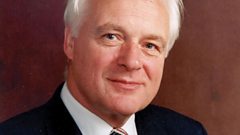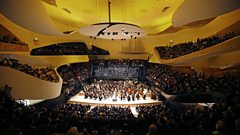Philharmonie de Paris, Boganyi Piano, Elgar Howarth
Tom Service visits the new Philharmonie de Paris, takes a look at the Bogányi, a revolutionary new model of piano just unveiled in Budapest and talks to Elgar Howarth.
Last on
Clip
Chapters
-
Philharmonie de Paris
Duration: 20:10
Boganyi Piano
Duration: 06:18
Elgar Howarth
Duration: 17:18
PHILHARMONIE DE PARIS
![PHILHARMONIE DE PARIS]()
Last week the new Philharmonie de Paris, a 2,400 seat concert hall, was opened to the public with a gala concert by the Orchestre de Paris attended by President Hollande. The hall, funded by the French Government and the City of Paris, has cost around 380m euros (over double the original estimate) and its construction has been delayed by twenty years. Tom Service visited the Philharmonie on the day of its opening and met the hall’s chief executive Laurent Bayle, artistic director Emmanuel Hondre, the acoustician Christopher Day and the conductor Paavo Jarvi. Tom speaks to Anthony Tommasini, chief classical music critic of The New York Times to get his impressions of the new concert hall and the programming and educational activities it is offering.
More information:
THE BOGANYI PIANO
![THE BOGANYI PIANO]()
A new model of piano called the Boganyi was unveiled in Budapest this week. Could its designer, the pianist Gergely Boganyi, have revolutionized piano making for the first time in two hundred years? Bogányi has developed a carbon-fibre soundboard which is sprung and disconnected from the piano frame, resistant to most exterior conditions including heat, humidity, cold, damp and dryness. The piano uses two legs instead of three, which have been shaped to act as an acoustic reflector to enhance the sound. It is possible to sustain a note for longer and the keyboard has been expanded with two extra notes on each side. It is also claimed that this piano can stay in tune longer than others. Tom talks to Gergely Boganyi and to the pianist John Turville who tried this new piano out earlier this week.
More information:
ELGAR HOWARTH
![ELGAR HOWARTH]()
Elgar Howarth has led a multifaceted career as a conductor, composer, arranger, and instrumentalist. He was the son of a brass band conductor and became principal cornetist of his father’s band at the age of fourteen. Whilst studying at the Royal Manchester College of Music he helped form the New Music Manchester Group with his fellow students Harrison Birtwistle, Alexander Goehr, Peter Maxwell Davies and John Ogdon. He pursued a career as a trumpeter – ranging from playing with the RPO through to The Beatles on Magical Mystery Tour. He took over the conductorship of the Grimethorpe Colliery Band and whilst there expanded the repertoire beyond the traditional brass band fare. Ligeti, chose Howarth to conduct the Stockholm premiere of his opera Le Grand Macabre, which led to conducting a succession of works by Birtwistle including Mask of Orpheus, Gawain and The Second Mrs. Kong. As well as brass band compositions Howarth has also written orchestral works and concertos. Howarth speaks to Tom Service about his roots in brass bands, playing under Rudolf Kempe, conducting Strauss at Garsington and above all his life-long advocacy of new music.
More information:
Credits
Role Contributor Presenter Tom Service Interviewed Guest Elgar Howarth Broadcast
- Sat 24 Jan 2015 12:15���˿��� Radio 3
Knock on wood – six stunning wooden concert halls around the world
Steel and concrete can't beat good old wood to produce the best sounds for music.
The evolution of video game music
Tom Service traces the rise of an exciting new genre, from bleeps to responsive scores.
Why music can literally make us lose track of time
Try our psychoacoustic experiment to see how tempo can affect your timekeeping abilities.
Podcast
-
![]()
Music Matters
The stories that matter, the people that matter, the music that matters







